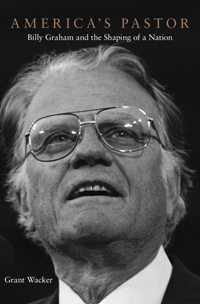Book Notes
 Grant Wacker, America's Pastor; Billy Graham and the Shaping of a Nation (Cambridge: Harvard University Press, 2014), 413pp.
Grant Wacker, America's Pastor; Billy Graham and the Shaping of a Nation (Cambridge: Harvard University Press, 2014), 413pp.
By Dan Clendenin
By the time that Billy Graham (b. 1918) retired from public ministry in 2005, he had shaped the religious landscape of modern America more than any person except Martin Luther King, Jr. After graduation from Wheaton College in 1943, then his 1949 crusade in Los Angeles, by the 1950's he was a "national personality." Grant Wacker's book isn't a conventional biography. He explores larger questions, like how and why Graham matters, how he shaped evangelical religion, and how evangelical religion related to American culture. He looks at Graham through eight "interpretive lenses" — Graham as preacher, icon, southerner, entrepreneur, architect, pilgrim, pastor, and patriarch.
Wacker admits that he's sympathetic to his subject. He almost always gives Graham the benefit of the doubt, but he's not uncritical. There's no meaningful criticism of Graham that he does not raise. Graham made "serious mistakes," most notably his odious remarks about Jews that were released on the Nixon tapes in 2002. His preaching could be powerful but also "soporific." He was a person of genuine humility who also mastered the art of self-promotion. He called himself a country preacher while befriending eleven successive presidents and some of the wealthiest and most powerful people in the world. He projected the image of a family man, but was an absentee father who traveled eight months a year. He built the BGEA into a $100 million a year empire, then made his son the President and CEO.
These and other contradictions have generated many "polarized interpretations," and yet Graham is routinely listed as one of the most admired people in the world. Wacker argues that he was a man of "uncompromised integrity" and "manifest sincerity." Graham changed his views on various issues across the decades. He expressed his regrets. He admitted his mistakes and tried to learn from them. He never pretended to be a scholar or an intellectual. He was, for his generation, "America's pastor" like no other.


